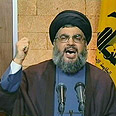
Nasrallah. Still at the helm
צילום: איי אף פי
'Nasrallah survived overthrow attempt'
Kuwaiti newspaper: Hizbullah leader faced Iranian anger and internal attempt to dislodge him
Hizbullah leader Hassan Nasrallah has survived an internal attempt to remove him from the helm of his organization, a Kuwaiti newspaper claimed on Tuesday.
The Al-Seyassah ('Politics') daily newspaper cited "informed political sources" as saying that Nasrallah outmaneuvered rival senior Hizbullah members who plotted to remove him from his position of secretary -general , and allocate him instead the symbolic position of supreme leader.
Two factions exist within Hizbullah today; one which advocates a close relationship with Syria, without negatively affecting the organization's relationship with Iran, while a second faction wants to give exclusive priority and political subordination to Iran's Supreme Leader Imam Ali Khamenei, and Iranian President Mahmoud Ahmadinejad, the report said. Hassan Nasrallah subscribes to the former approach, it added.
According to the report, the plot against Nasrallah was motivated by frustrations within the pro-Iranian faction in Hizbullah, due to Nasrallah's decision to adopt Syria's wish to remove the pro-western Lebanese government from power, through a series of mass demonstrations and threats of violence. So far, these attempts have all failed at toppling the Fuad Seniora administration.
"Nasrallah's plan reflected the Syrian wish of toppling the Lebanese government, and this is not Iran's plan. Differences exploded within Hizbullah, and a leadership conference was held in an inner southern suburb of Beirut. What took place during the conference remains untold," the report said.
Iran too had expressed mounting dissatisfaction with Nasrallah for acting solely in Syria's interests in Lebanon, the report claimed. "Nasrallah had anticipated the conference (to try and remove him) and visited Iran secretly to clarify his position, especially after the outpouring of Iranian discontent over Nasrallah's bias towards the Syrian line," the report claimed.
"Information sources add that Nasrallah faced opposition from some offices in the party leadership, and some suggested he be given the status of emeritus supreme leader of the party and give up the post of secretary - general. All of these attempts failed and Nasrallah managed to thwart them. He earned Iranian support in his recent visit to Tehran, and he earned the support of large groups of the middle and lower-ranking party leaders, in addition to enjoying support among the masses of the party and the Shiites in general," Al-Seyassah quoted sources as saying.
Nasrallah also used a speech last week to send a message to those within Hizbullah who had attempted to dislodge him, the report added.
'Nasrallah spoiled Iranian-Saudi agreement'
Dr Ely Karmon, a specialist on international terrorism and Shiite politics, told Ynetnews that he had "no confirmation from other sources that there was this kind of resistance from within Hizbullah," but added that he did recognize a number of truths in the Kuwaiti report, "such as Nasrallah's full backing of Syria, not at the expense of Iran, but certainly people are not pleased with that."Karmon is a senior analyst at the Institute for Counter-Terrorism (ICT), part of the Interdisciplinary Center in Herzliya.
He said Hizbullah was responsible for scuttling an attempt to reach an agreement over Lebanon between Shiite Iran and Sunni Saudi Arabia, both states which exert major influence in the divided Lebanese state.
"Last January, the Iranians made an effort to intercede between Hizbullah and other pro-Iranians in Lebanon and the Saudis. Ali Larijani, s ecretary of the Iranian Supreme National Council, visited Riyad and apparently reached some form of agreement to calm the Lebanese waters. But right after the understanding, Nasrallah expressed opposition. The Syrians were angry at the agreement because it did not challenge the international court on the murder of former Lebanese prime minister Rafik Hariri (for which Syria is blamed)," Karmon explained.
"The agreement with the Saudis fell through. It shows Nasrallah leads a strongly pro-Syrian movement," he added.
"What's really significant is Nasrallah's behavior, which uniquely aided the Syrians, and helped Syria to sabotage the agreement between Iran and Saudi Arabia," Karmon said.
Since the Second Lebanon War, Nasrallah has also faced scathing criticism from senior Lebanese Shiite clerics over his decision to launch an unauthorized conflict with Israel, Karmon added. In addition, Hizbullah commanders recently fired by Nasrallah for their failures during the war with Israel may also have a bone to pick with the Hizbullah leader, Karmon said.










